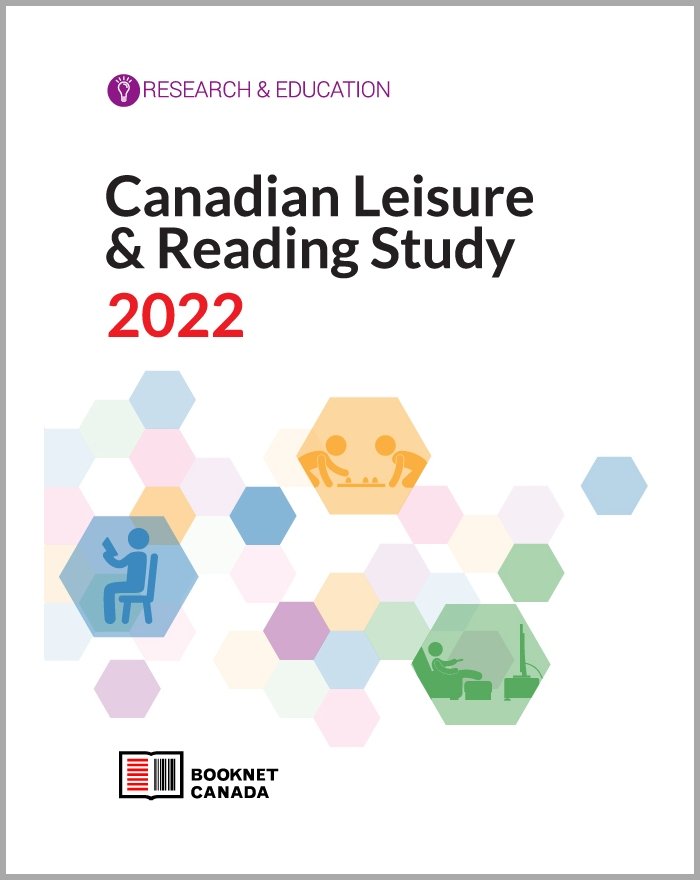The tenth edition of our Canadian Leisure & Reading Study is now available. Learn about the reading behaviours of Canadians and find out what’s changed compared to previous years. What formats are getting more traction among readers? How much time are Canadians dedicating to reading? How many books do they read per year? We tell you all about it in this free study. To jump right in, download a PDF or EPUB copy here or keep reading for some highlights.
About the data
This survey was fielded in January 2023 to 1,290 Canadians over the age of 18. Where noted, we compare the 2022 results to the 2021 results which were gathered from a survey fielded in January 2022 to 1,282 Canadian adults, and to the 2020 results where 1,253 Canadian adults took our survey in January 2021.
For all surveys, 1,000 respondents and 1,001, in the case of the 2023 survey, identified as “readers” — those who had read or listened to a book or part of a book at least a few times a year in the past year.
When we mention “buying”, we're referring to buying books from an online retailer (or retailing app for ebooks and audiobooks), a physical bookstore that primarily sells new books, a used bookstore or thrift store, a general retailer, or a subscription service. Borrowing refers to getting books for free from a public library, another person (gifting or lending), a free internet site, or an illegal file-sharing site.
Leisure time
In terms of the perception of leisure time and whether or not Canadians think they had enough of it in 2022, we learned that 51% believe they had enough leisure time, 30% felt like they had more than enough free time, and 19% didn’t feel they had enough.
Readers reported similar perceptions, 51% of them said they had enough leisure time and 31% said they had more than enough.
How did Canadians use their leisure time? The most popular weekly activities were watching videos/tv/movies (90%), cooking (86%), listening to music (85%), browsing social media/web (84%), and spending time with family (71%).
Reading as a leisure activity
Overall, 49% of Canadians said they read or listen to books weekly and 31% said daily. For readers, reading and listening to books came in eighth place on a list of activities they do weekly (64%), and sixth place on a list of activities they do daily (40%).
How many books did they read or listen to in 2022? Half (50%) read or listened to 1-5 books, 28% read or listened to 6-11 books, 16% read or listened to 6-11 books, and 6% were heavy readers and read or listened to 50 or more books last year.
We also learned that print readers preferred to buy over borrow — 52% vs. 46%. Digital readers, on the other hand, were more inclined to borrow their books — 40% chose to buy and 59% decided to borrow. When it comes to audiobook listeners, 44% purchased them and 55% borrowed them.
How did Canadians discover the books they read? The most popular method was word of mouth (30%), followed by the discovery at bookstores and public libraries (tied at 26%), next, we have online book retailers (21%), and social media (20%).
Other things we learned
More readers viewed or searched out book-specific social media posts, for example on BookTok, BookTube, Bookstagram, or similar content daily in 2022 than visited book-specific social networks (e.g., Shelfari, Goodreads, 49th Shelf, Wattpad, etc.).
The main reason readers read or listened to books in 2022 was for enjoyment / entertainment at 52%. Interestingly, 27% of respondents said they read or listen to books for brain health (to improve memory, prevent diseases).
More readers seem to be participating in reading challenges (11% in 2022 vs. 7% in 2021) and tracking their book reading in 2022 (19%) than did in 2021 (16%).
Participation in online book clubs increased from 22% in 2021 to 28% in 2022.
Readers continue to overwhelmingly favour print books (62%). Of all print readers, 58% prefer paperbacks, and 55% prefer hardcovers.
Audiobook preference continues to rise, from 8% in 2019 to 12% in 2022.
A significant majority of readers continue to agree that books should be representative of a variety of experiences (90%).
As mentioned earlier, this is just a sample of the insights included in the study, be sure to download your copy now and feel free to share widely!


















Sales and library circulation data of Body, Mind & Spirit titles during the the first quarter of 2025.